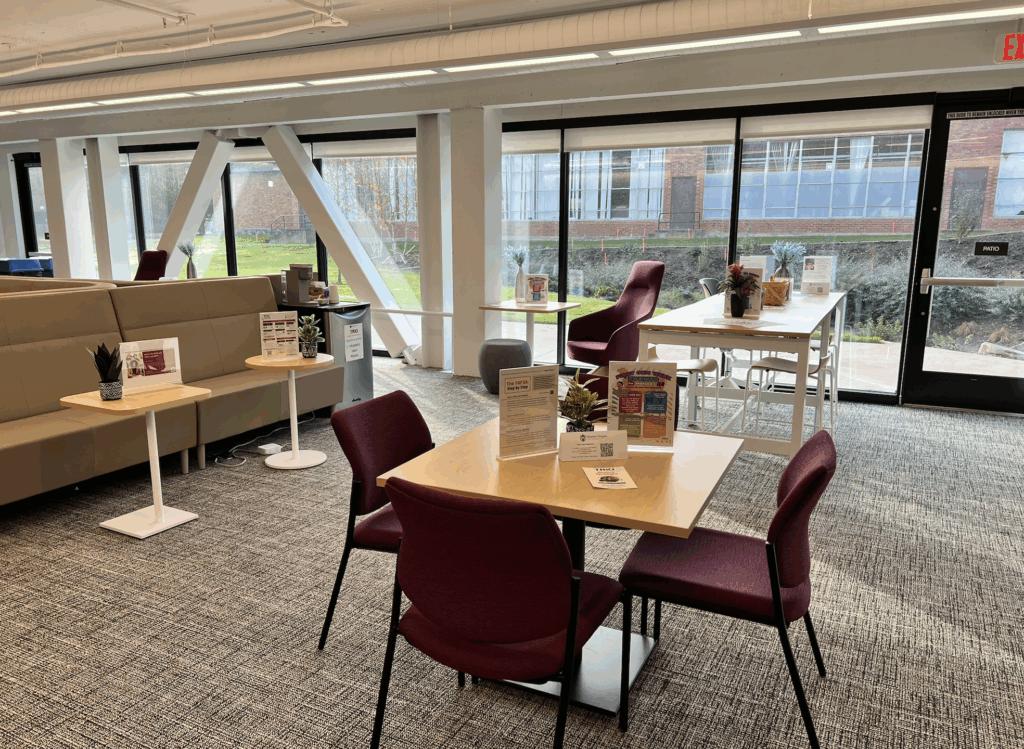
Oct 29 2025 | Abbi Duhart | News Editor
Being first-generation means that neither of the student’s parents or guardians graduated with a four-year degree. If someone’s parents earned an associate degree or started at a four-year college but didn’t finish, the student is still considered first-gen. Identifying as first-gen means that a student has an amazing opportunity to achieve and succeed, yet they may not have the same guidance about the process of enrolling in college that non-first-gen students have, making the transition much more confusing and scary. For these reasons, first-gen students can often feel vulnerable or face imposter syndrome because they encounter different barriers.
To support first-gen students, TRIO is putting on various events during First-Generation Week, starting Nov. 3. TRIO is a federally funded nationwide program implemented to advise and assist students who are first-gen, low-income or receive accommodations through Disability Access Services. Students part of TRIO have a specific advisor who helps them with academic, career and major advising, finding resources, finding a job and more.
First-Generation Week happens at Western as a replacement for First-Generation Day, which is a national celebration on Nov. 8. Because Nov. 8 is a Saturday this year, TRIO created First-Generation Week so students can celebrate the week leading up to First-Generation Day. Every day during First-Generation Week has different events that help students connect with the diverse resources around campus.
Each day of events during First-Generation Week has a different theme. Monday, Nov. 3, is all about basic needs. The day will start with a kick-off happening in the TRIO lounge at the Student Success Center from 10 a.m. to 1 p.m. This is primarily to outline the events happening throughout the week, but students can also come for some fun games and snacks. Next, students can head over to the Werner University Center from 1 to 3 p.m. to learn about meal prepping. Meal prepping can be especially hard for students in terms of budgeting, so this event can help them learn how to actively and efficiently meal prep at a lower cost. 2 to 4:30 p.m., there is a drop-in for students to chat with SNAP workers in the Werner University Center. SNAP is a federal nutrition assistance program that gives students a certain amount of money each month to purchase groceries. In the same location, there are Food Pantry and Stitch Closet tours happening from 2 to 4 p.m. These are both helpful resources on campus that students may not know about, and these guided tours can show students where they are and how they work.
Tuesday’s theme is mental health. Starting off, there are presentations happening from 11 a.m. to 12 p.m. in the Santiam Room in the Werner University Center. Counselors from the Health and Counseling Center on campus will be giving presentations about the importance of mental health. Later, there will be a trail walk starting in the TRIO lounge from 1 to 2 p.m. Students will join a walk around campus and participate in a mediated conversation where they ask each other questions and just talk about life. From 2 to 4 p.m., students can head back to the TRIO lounge to participate in a mini brain break where they can do some arts and crafts and join a “Mario Kart” tournament.
Wednesday’s theme is community. Students can attend a first-gen fair happening in Richard Woodcock Education Center Room 101 from 10 a.m. to 3 p.m. Here, they can connect with fellow students, staff, faculty, resources and departments around campus. Each department will have a table. Students who go will receive a bingo card to mark off each table they attend, with a possibility of winning a prize. There will also be free food at this event. At 4 to 5 p.m. in the Student Success Center, Room 203, a workshop with Student Success and Advising will take place. This will surround the theme of professional goal setting.
Thursday’s theme is “step in the right direction,” beginning with a Career and Professional Pathways fair happening from 11 a.m. to 2 p.m. on the second floor of the Student Success Center. Students can go to network with recruiters from various organizations and jobs, as well as with alumni. These professionals will be giving students advice on how to land jobs in their chosen career path. From 3 to 5 p.m., there will be a TRIO and first-gen alumni panel in the Willamette Room in the WUC. Students can talk with them and get an understanding from someone of a similar background on how to get to the career they’re in.
Friday’s theme is celebration. A Tri-Alpha induction ceremony will be happening in the Willamette Room from 9:30 to 11:30 a.m. This is for the Alpha Alpha Alpha Honor Society, an honor society for first-gen students. Students can come to celebrate and support inductees as they join Tri-Alpha. 12 to 3 p.m. in the TRIO lounge, there will be a First-Generation Day celebration to celebrate National First-Generation Day. There will be different stations and games for students as well as cake to enjoy. Students who attend any event throughout the week will be entered in a raffle for prizes on Friday.
Andres Hernandez, the first-gen coordinator, explains that everyone — not just first-gen students — can benefit from attending these events. While the resources are catered to help first-gen students more, all students can learn how to best support first-gen students who often come from different backgrounds and face different barriers. If anything, students can attend any event throughout the week to learn about helpful resources, potentially win some prizes and maybe even meet some new friends.
Contact the author at howlnews@mail.wou.edu




